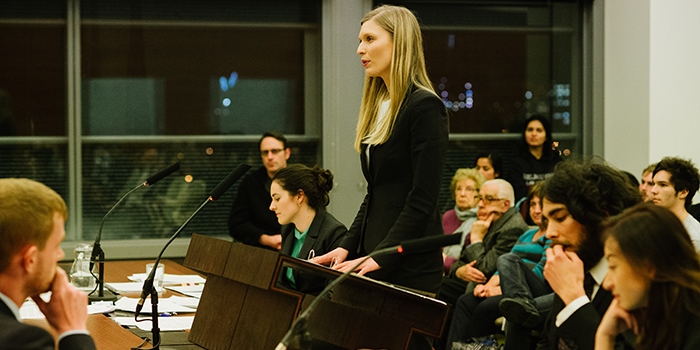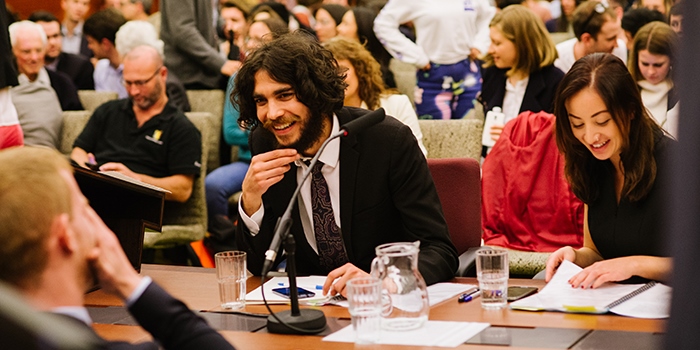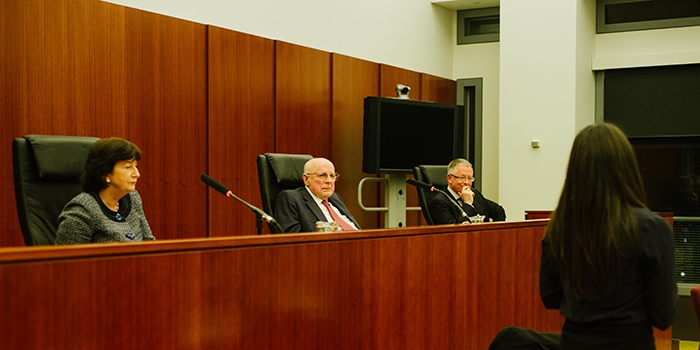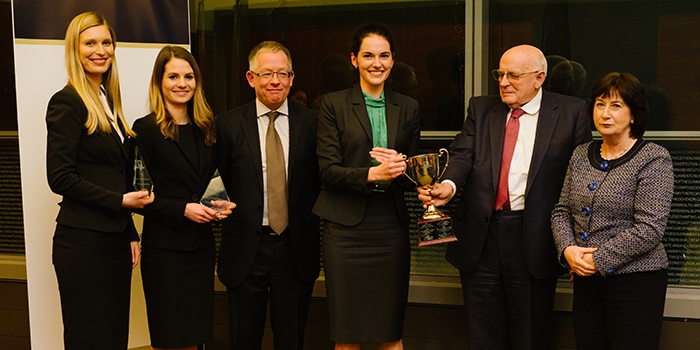2015 MULSS Mooting Grand Final
Melbourne Law School students battled it out last Thursday 17 September at the Federal Court at the Grand Final of the Melbourne University Law Students' Society Mooting Competition.

The Respondent team, comprising Kirsten Sugden, Alexandra Harrison-Ichlov and Kathryn Wright, arose victorious after oral submissions relating to a constitutional law question prepared by Melbourne Law School academic, Ms Kristen Walker QC.
Representing the (fictional) City of Melbart Municipal Council, they were successfully able to make out that the council was not a trading or financial corporation within the meaning of s51(xx) of the Commonwealth Constitution.
Commiserations went to the Appellant team, represented by John Morrisey, Jack Coventry and Allison Fong. Their (fictional) client, Homer Dingbat, was attempting to commence proceedings against the council under the Fair Work Act 2009 (Cth). However, Mr Dingbat could be successful only by making out that the council was a legal corporation.
While the Grand Final judging panel always comprises highly esteemed legal professionals, this year's bench was particularly impressive. On the bench were Professor William Gummow (a former Justice of the High Court of Australia), Justice Pamela Tate (from the Victorian Court of Appeal) and Chris Fox (a partner in King & Wood Mallesons' litigation practice group whose firm sponsors the competition).
Mooting is traditionally an extracurricular activity in law schools which students juggle alongside their studies.
"The problem is released 48 hours before the moot, and we spend two very busy days researching and preparing our oral and written submissions," says Alexandra Harrison-Ichlov, a member of the winning Respondent team.

Ms Harrison-Ichlov spoke highly of the skills she has learned throughout the process, which she believes will help in her law career.
"The opportunity to delve into unfamiliar areas of law, but with a focus on representing a client, was particularly formative. As was the intellectual challenge of standing up to submit your case to the bench."
In particular, Ms Harrison-Ichlov noted the teamwork and collaboration skills required for her team to have progressed to the final.
"We believe that having all three of us researching at the beginning enabled us to all get our heads around the problem, rather than delegating specific tasks to each other.
"Our final afternoon before the moot is usually spent rehearsing our speeches, with one person acting as the judge so that we can predict what questions we might get asked."
Asked if advocating orally was more challenging than other forms of legal work, Ms Harrison-Ichlov said preparation was the key.
"It's a very satisfying feeling when you can apply the knowledge you've learned when advocating for the client," she says. "Appearing in front of Professor Gummow in the Grand Final was certainly one of the most challenging benches we've faced!"

Alexandra also notes the particular challenges faced by women in the realm of advocacy, which makes their victory all the more impressive.
"What is especially important to me is the fact that we are an all-female team. I think it's important to encourage women to engage in legal advocacy, not only because of the fundamental oral and research skills that it enables you to hone, but also as a way to advance the role of women in the legal profession generally."
The night was a step forward for women's advocacy in more ways than one: the entire student competition was overseen by Mooting Directors, Jessica Cao and Stephanie Mercuri.
As well as organising the Grand Final, the two Directors oversaw all seven rounds of the competition, which began with over 200 student competitors while studying full-time.
